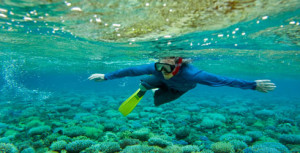 On a recent business trip I stole a few days of vacation at La Jolla, in southern California, with my wife. We walked on the cliffs and the beaches and talked to the barking seals and we watched a man die right in front of us.
On a recent business trip I stole a few days of vacation at La Jolla, in southern California, with my wife. We walked on the cliffs and the beaches and talked to the barking seals and we watched a man die right in front of us.
He had been snorkeling in a nearby cove when kayakers started yelling and waving their arms over their heads. A lifeguard jet-ski was launched and picked him up and loaded him onto a short nylon stretcher behind. That’s how lifeguards operate in La Jolla. With full police siren, the jet-ski zoomed into the small cove where we were standing and other lifeguards, presumably, appeared and began vigorous CPR on the guy. He seemed slightly responsive at first, but that could have been just head movements caused by the chest-pounding he was getting.
He was in a wetsuit so he bore no social signifiers of occupation or status. Just a man. He was in his fifties, face tanned and creased, and he had a gray, short-cropped beard. He looked a little like “The Most Interesting Man in the World,” on those awful Corona Beer commercials. But soon his face was as gray as his beard and even while somebody struggled with an IV bag, it was obvious he had died. They lifted his limp form onto a full-sized stretcher and carried him up to the road and into a waiting ambulance. He was whisked off under another cloud of sirens.
On one level it was a mundane occurrence. People die every day, some of them at the beach. According to the CIA (and they would know), over 150,000 people die every day. So it’s not a rare event. And at least this guy went out doing what made him happy, not wilting away in some yellow hospital room. Still, we cover up the fact of our mortality so well in this society, it’s still shocking when you see someone actually go over the edge into that abyss. Combat soldiers might have a different take on that.
The guy could have had a heart attack in the water before anybody even noticed. How do you distinguish a dead snorkeler from a live one? The drama of the rescue system kicking into gear was testament to the community’s concern for everyone’s well-being, and not just for public safety at the beach. It’s a big deal when anyone in the human community dies. At least it’s a sobering moment. Reminds us of you-know-what.
What struck me about the incident were two things. First, how everyone there at the beach, and out on the water, was quiet, somber, and still while they hauled him in and tried to revive him. Nobody in the crowd seemed to know who this guy was, but everyone knew instinctively he was one of us, in some universal, non-tribal compassionate response. That was good to see.
The other thing was that as soon as the ambulance was gone and the siren had faded, everything went back to normal. The kayaks returned to their clusters and people started going back into the water to play. Maybe the mood wasn’t quite as exuberant as it had been before, but the incident was over and the status quo was re-asserted. My wife and I continued our walk along the beach.
Each person evaporates from the planet without much trace. His family will remember him for a while. I’m still thinking about him a week later. But soon enough, his entire existence will be forgotten. It will be as if he had never lived. Each of us is The Most Interesting Person in the World, in our own eyes, but not in anyone else’s. The only person who really knew what his life meant, was him. For the rest of us, he was an interloper. The sun still shines, the seals still bark and the tide goes out as always.
